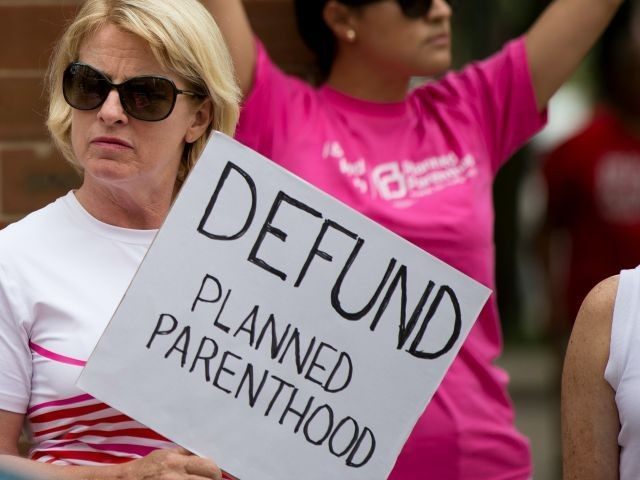Leaders of the House Energy and Commerce Committee want Planned Parenthood Federation of America (PPFA), StemExpress, and other biomedical companies to provide briefings and information concerning the organizations’ practices in the collection, sale, and/or donation of human fetal tissue.
Though the House is officially in recess, committee chairman Rep. Fred Upton (R-MI), Oversight and Investigations Subcommittee chairman Joe Pitts (R-PA), committee vice chairman Marsha Blackburn (R-TN), and committee chairman emeritus Joe Barton (R-TX) signed letters to Planned Parenthood president Cecile Richards, StemExpress, Advanced Bioscience Resources, Inc. (ABR), and Novogenix Laboratories. A news release posted on the committee’s website states the request for further information “build[s] on the committee’s investigation into the shocking Planned Parenthood videos released in recent weeks.”
The letter to Planned Parenthood’s Richards requests she arrange for interviews with the organization’s top medical and research personnel who were shown in undercover investigative videos arranging for the harvesting of body parts of aborted babies for potential sale to biomedical companies.
The committee requests to interview the following: the president of PPFA’s Medical Director Council Dr. Mary Gatter, who was seen in one undercover investigative video haggling over the price of the body parts of aborted babies; Dr. Savita Ginde, vice president and medical director of Planned Parenthood of the Rocky Mountains, who was seen in another video discussing how to avoid getting caught selling the body parts of aborted babies; and director of research for Planned Parenthood Gulf Coast Melissa Farrell, in yet another video shown discussing the sale of whole, intact aborted babies to a broker from biomedical companies.
The committee wrote to Richards as well: “[P]lease also identify the appropriate representatives from PPFA affiliates, other than those referenced above, who are currently engaged in the donation and disposition of fetal tissue.”
Richards was asked to comply with the committee’s request by the end of this week.
Letters sent to the biomedical companies indicated the committee is seeking information and briefings concerning their respective “practices related to human fetal tissue collection, sale and/or donation.”
The committee is seeking the following information from the biomedical companies:
- Your organization’s procedures to assure proper informed consent for fetal tissue donation.
- Your organization’s practices for collecting fetal tissue, including guidance to, and training for, agents or representatives involved in the acquisition of fetal tissue.
- Your organization’s practices and/or policies relating to the quality or quality control of fetal tissue, and how your organization decides what types of fetal tissue to collect.
- The prices or fees that ABR/Novogenix/StemExpress pays for each type of fetal tissue, and how much ABR/Novogenix/StemExpress paid in 2014 for fetal tissue.
- The prices or fees that ABR/Novogenix/StemExpress sets for each type of fetal tissue provided to researchers, including what guidance or criteria, if any, ABR/Novogenix/StemExpress provides to researchers on prices and fees, and the total amount of fees collected and costs expended by ABR/Novogenix/StemExpress relating to fetal tissue.
- The number of years ABR/Novogenix/StemExpress has engaged in fetal tissue collection and whether and how ABR/Novogenix/StemExpress assures that the collection, sale and/or donation of fetal tissue is in compliance with federal and state legal requirements, or is in accordance with rules made by ethics boards by institutions buying fetal tissue from ABR/Novogenix/StemExpress.
In the letter to ABR, the committee leaders posed one additional request:
For the last ten years, any contracts and/or other arrangements with the National Institutes of Health, the Food and Drug Administration, and/or any other Federal government agency or department, including date(s) of each contract, amount(s) of each contract, and nature of deliverables or services.
The letter sent to StemExpress founder and CEO Cate Dyer cited a New York Times article reporting that the company is “a major supplier of fetal tissue, and that StemExpress’s revenue was reported in August 2014 to be $2.2 million, with fetal tissue accounting for about 10 percent of the company’s business.”
The committee members also sent a note to Dyer, who, ironically, is the sister of Charlotte Ivancic, House Speaker John Boehner’s health policy director. The House notes that a StemExpress brochure “contains an endorsement from Planned Parenthood, and a flyer from StemExpress aimed at clinics providing fetal tissue,” which states these clinics would be “contributing to the fiscal growth of’ their clinics.”
In their letters, the committee members remind the companies that “under the NIH Revitalization Act of 1993, it is “‘unlawful for any person to knowingly acquire, receive, or otherwise transfer any human fetal tissue for valuable consideration if the transfer affects interstate commerce.’”
In late July, 135 House Republicans, led by Blackburn, sent a formal request as well to U.S. Attorney General Loretta Lynch, demanding an immediate investigation by the Department of Justice (DOJ) into Planned Parenthood’s practices of harvesting aborted baby body parts for potential sale to biomedical companies.
In a response, dated August 6, sent to Blackburn and the other signers of the letter, Peter J. Kadzik, assistant Attorney General, replied:
In your letter, you provided the Department of Justice (the Department) with a description about a video that recently surfaced in the media, and you raised concerns about whether the actions of abortion providers are consistent with federal law. You requested that the Department conduct a full investigation to determine whether violations of the Public Health Service Act have occurred, based on the video’s content.
Under the Public Health Service Act, the department can investigate complaints concerning any person who knowingly acquires, receives, or otherwise transfers any human fetal tissue for valuable consideration if the transfer affects interstate commerce. We are aware of the matter, and the Department is reviewing all information we have received on the subject. We will determine what steps, if any, to take at the appropriate time.

COMMENTS
Please let us know if you're having issues with commenting.